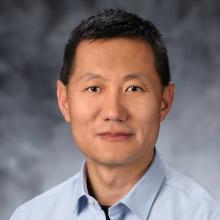Peng Li
CRML Affiliated Faculty
Professor, Electrical and Computer Engineering
Our research activities in machine learning (ML) are at the intersections between machine learning algorithms, neuroscience, and hardware system design. In brain-inspired computing, we develop biologically-plausible spiking neural architectures, learning principles, and training methods. In the ML hardware computing system space, we work on energy-efficient spiking neural processors and dedicated statistical learning and deep learning hardware accelerators. In robust machine learning, we assess uncertainty and resilience of ML and develop robust ML models. And last but not least, we work on ML-enabled automated optimization and verification tools to improve the quality of IC chips and design productivity.
Peng Li received the Ph. D. degree in Electrical & Computer Engineering from Carnegie Mellon University in 2003. He was on the faculty of Texas A&M University from August 2004 to June 2019. Since July 2019, he has been with University of California at Santa Barbara as a professor of Electrical and Computer Engineering.
His research interests are in brain-inspired computing, electronic design automation, integrated circuits and systems, robust machine learning, and application of machine learning to IC design. Li’s work has been recognized by an ICCAD Ten Year Retrospective Most Influential Paper Award, four IEEE/ACM Design Automation Conference (DAC) Best Paper Awards, an Honorary Mention Best Paper Award from ISCAS, an IEEE/ACM William J. McCalla ICCAD Best Paper Award, two SRC Inventor Recognition Awards, two MARCO Inventor Recognition Awards, and an NSF CAREER Award. He was honored by the ECE Outstanding Professor Award, and was named a TEES Fellow, William O. and Montine P. Head Faculty Fellow, and Eugene Webb Fellow by the College of Engineering at Texas A&M University. He was the Vice President for Technical Activities of the IEEE Council on Electronic Design Automation from Jan. 2016 to Dec. 2017. He is a Fellow of the IEEE and has consulted for Intel and several Silicon Valley startup companies.
